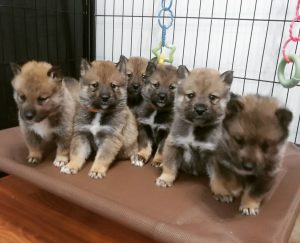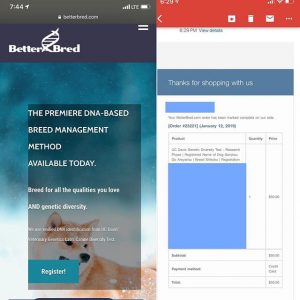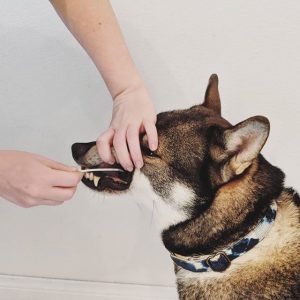Shikoku Genetic Diversity DNA testing through UC Davis with Better Bred
ANY purebred Shikoku can be swabbed for DNA testing. You do not have to have an intact/breeding/showing dog. If you love Shikoku and you have wondered how you can contribute to the future well-being of the breed, read on!
What the BetterBred program will provide
It will show an individual dog’s internal relatedness (measurement of inbreeding). Even within a litter, inbreeding can vary. Litters with lower IR ranges have less likelihood to express recessive component diseases.
Simply knowing if a dog is more outbred or inbred is not enough information. An inbred dog can still have unique genetics compared to the rest of the breed and is therefore potentially very valuable to a breeding program. Two dogs can have the same IR, but can have completely different genetics.
This means we can pinpoint outliers - dogs that may have high IR but uncommon genes due to lines losing favor or popular sires - and could be beneficial to the population by producing offspring with both low IR and uncommon genes.
Avoid losing less common genes by determining which ones are seen infrequently in the breed and selecting dogs with those genes for breeding (assuming all else is breeding quality or can be compensated for). This test looks at genes that are not normally expressed visually, so cannot be selectively bred for without testing for them.
As with everything else (health tests, structure, working ability, drive, temperament) you can’t just look at one number and make choices. But this test will give us more data to work with to make better decisions when planning litters.
Why is this helpful?
- When a breeder is making selections between two very similar dogs to breed, they can choose a dog that is genetically more outbred or has inherited more unique genes.
- If a breeder is trying to choose which puppy to hold back for their breeding program from a litter, they can make a more informed choice based on their genetic results.
- Importing new dogs can get expensive, and it can be difficult to find dogs that are almost completely unrelated from the other dogs a breeder has available already. This test could help breeders import more diverse dogs without relying on pedigrees alone.

Photo credit: Instagram @hachidorisou_shikoku
Once we reach 100 dogs, you will get a certificate that will tell you your dog’s:
- Internal Relatedness (IR) – lower IR values indicate more genetic diversity – compared to the population of Shikoku sampled. This will tell you how outbred or inbred your dog is.
- Diversity Panel – you can see if your dog has common or uncommon genes. On BetterBred you will be able to see how often different genes show up in the population.
- Dog Leukocyte Antigen (DLA) Haplotypes – Typically the more diverse the haplotypes, the healthier the dog. UC Davis tests the most areas of the DLA of any test available. DLA has been found to be associated with diseases in some cases.

Where can I learn more about the Better Bred program?
Information about this program comes from the BetterBred website. You can sign up for a free membership and get more detailed information about what this program will provide in the free course they offer. The videos can be completed in less than an hour, even with stopping to take notes.
- Free Membership signup
- Free BetterBred Genetics course
- There is a Facebook group for this program for additional information
Our current goals
- Get as many “unrelated” dogs sampled as possible first, and then...
- Get as many Shikoku into the database as possible, especially intact/breeding dogs
- Get any dogs affected by epilepsy/neurological issues sampled
The database is only as useful as the population sampled, which is why priority number one is to try to get as many unrelated dogs sampled as possible. From there, it is helpful to get as many dogs into the database as possible because the more individual DNA we have, the more accurate the database will be as a representation of the genetic diversity of our breed.
Why would we include dogs that are not being used for breeding? It is useful to see what genetics our breeding populations are producing. It will give us a more complete picture of the Shikoku breed population.
Epilepsy/ neurological issues: Although this test will not pick up genetic issues, we may be able to see a correlation between some of the data and affected dogs.

Photo credit: Instagram @rumomeetstheworld
I want to swab my dog! How do I get started?
Cost is $50 USD per test ($80 after the first 100 dogs are in) and can be ordered here.
You will get a packet with swabs to take saliva samples that you will then return to UC Davis. For Shikoku owners outside of the USA, we may be able to arrange for someone to collect swabs from people in one region to combine shipping.
If you have ordered or swabbed your Shikoku, kindly contact us to inform NASC so we can keep track of the pedigrees of dogs being swabbed.
How is Better Bred different from health testing done by breeders?
Reputable breeders will health test their dogs prior to breeding to aim for optimal results for a healthy and happy litter of puppies. These tests commonly include: Hips, Patella, Eyes; and some breeders also opt for Elbows and Cardiac testing.
Breeders currently check what is physically presented in the dog at its current state of health at the time of recording or testing. However, cannot check for hidden traits that may be passed on to later generations. The Better Bred program will check the DNA to discover unknown traits and conduct studies to identify them. Since DNA are the instructions or programs that create new life, sequencing DNA will allow breeders to identify known traits in order to select the best possible pairing in the parents of future puppies.
How can I donate or help further?
A few members of the North American Shikoku Club are going to be raising funds to purchase tests for owners who cannot afford the test. We understand that for people who only have Shikoku as a pet, this test may not seem as critical or useful. Any amount will help! Donated tests will go to less related dogs first.
If you would like to donate additional funds for tests, please send us an email for further instructions.
Thank you in advance for your support and/or participation!
